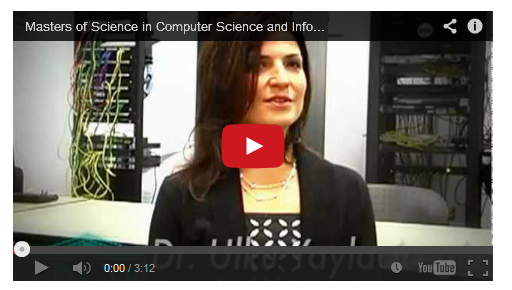| |
Jan 29, 2026
|
|
|
|
|
2023-2024 Graduate Catalogue Archived Catalogue
Computer Science and Information Systems, M.S.
|
|
 Return to: Graduate Programs Return to: Graduate Programs
Graduate Coordinator: Dr. Jeff Cummings

The Department of Computer Science in the College of Science and Engineering and the Department of Information Systems and Operations Management in the Cameron School of Business offer a joint program of study leading to the Master of Science degree in computer science and information systems. This interdisciplinary program is targeted primarily at students who received undergraduate degrees in computer science or information systems and at computer professionals with equivalent academic preparation. A secondary audience for the program is students whose background is in related areas such as business, mathematics, and electrical engineering, or working professionals seeking to migrate to the information technology arena. The interdisciplinary nature of this program provides a unique balance of advanced scientific knowledge, commonly found in the computer science field, and the development of systems and solutions, applied in a business environment, usually considered the focus of the information systems field. This unique blend will provide a foundation for information technology professionals to have a broader perspective of the rapidly expanding and evolving science of technology and how it can be managed and leveraged to support and further commerce and trade activities.
|
Admission Requirements
Applicants seeking admission to the graduate program in computer science and information systems are required to submit the following to the Graduate School: - An application for graduate admission.
- Official transcripts of all college work (undergraduate and graduate).
- Certificates of training in computer science/information systems if applicable.
- Official scores on the Graduate Management Admission Test (GMAT) or Graduate Record Examination (GRE). Scores more than five years old will not be accepted.
- Three recommendations from individuals in professionally relevant fields.
- Applicant’s resume and a letter of interest.
- Additional materials may be required (e.g., TOEFL or IELTS scores for international students). TOEFL scores are good for two years from the date the test is administered.
- Application and supplemental documents must be submitted by the published deadline.
Each applicant must have a strong overall academic record and have successfully completed the undergraduate level prerequisites in computer science and information systems courses or their equivalent: two programming courses, and a course in each of data structures, database, software engineering or analysis and design, data communications or networking, financial accounting, marketing, finance, and management. Deficiencies in a student’s undergraduate preparation will be ascertained by the MSCSIS Advisory Committee. Placement tests may be administered to incoming students at the discretion of the advisory committee to assist with the evaluation of deficiencies. Persons entering the program must have completed a basic core of computer science and information system courses. Professional experience may be accepted for some of the prerequisite coursework. Professional experience and/or coursework from other institutions must be approved by the MSCSIS Advisory Committee. Professional experience and/or technical certifications will be evaluated on a case by case basis for any prerequisite substitution. Admissions decisions are based upon the examination of several factors, and where other indicators of success warrant, individuals who fall below the established criteria may still be considered for admission. Degree Requirements (36 total credit hours)
- Programs leading to the Master of Science degree require a minimum of 36 credit hours of graduate study. This includes six required core courses (18 credit hours) providing a mix of theoretical underpinning, technical skills, and information technology perspectives and elective courses (12 credit hours) that provide the opportunity for additional study in a variety of areas to be determined by the student and his/her advisory committee. A research project or a thesis (6 credit hours), will serve as the capstone experience.
- No more than 9 credit hours from those courses cross listed as 400/500 may be applied toward the degree. Graduate courses offered by other departments may be approved by the student’s advisory committee. A maximum of six credit hours may be transferred from another regionally accredited institution. Grades earned on transfer work must be equivalent to a “B” or better, and courses must be acceptable to the student’s advisory committee. A minimum of 30 credit hours of graduate study must be completed in residence.
- A student must have no less than a 3.0 GPA on all graduate-level courses.
- The student must successfully complete an oral defense.
- The program shall be completed within five years of the date of first registration for graduate study.
- No more than 9 credit hours from the list CSC 591 , MIS 591 , CSC 595 , MIS 595 , CSC 598 , and MIS 598 may be applied toward the degree.
Option 1 – Research Project
This option requires at least 36 credit hours of graduate credit, with six credit hours for the project (CSC 594 or MIS 594 ). Under this option, the student is required to complete a six credit hour research project under the direction of a graduate advisory committee. This project could involve the development of software, work on a project (potentially part of a team), independent research, or some other scholarly pursuit. The outcome includes a technical paper written by the student and an oral defense acceptable to the student’s advisory committee. In the oral defense, the student is responsible for the domain of the research project as well as the program coursework. Option 2 – Thesis
This option requires at least 36 credit hours of graduate credit, with six credit hours for the thesis (CSC 599 or MIS 599 ). Each student must present and defend a thesis, based on original research, acceptable to the student’s advisory committee, prior to graduation. In the oral defense, the student is responsible for the domain of the research effort as well as the program coursework. The thesis defense is open to the public. |
 Return to: Graduate Programs Return to: Graduate Programs
|
|